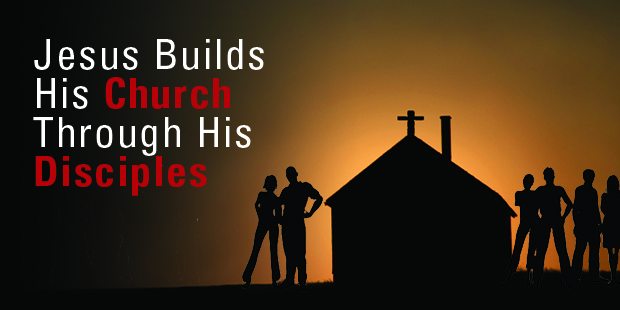
How Discipleship Becomes More than a Class: Embodiment
The story of discipleship in the beginning days of the church was lived out as those early Christians went about their lives – telling family, friends, masters, slaves, soldiers about their new lives in Christ.
In other words, they lived out their faith every day in the relationships they already had with others.
Fast forward to today: Every weekend, untold numbers of Christians leave a church building seeing no connection between their faith and their everyday lives. The next six days between Sundays seem like a spiritual vacuum, with little to no spiritual meaning.
For first-century believers, daily life was intertwined with discipleship. What happened?
Does your church only see discipleship as a class to be taken or a study to attend?
THE QUICK SUMMARY – Faithful Presence, by David Fitch
In our quest to renew the church, Christians have walked through seeker-friendly, emergent, missional, and other movements to develop new expressions of the body of Christ. Now in the post-Christian world in North America we’re asking the question again: Is there a way to be the church that engages the world, not by judgment or accommodation but by becoming the good news in our culture?
In Faithful Presence, noted pastor and scholar David Fitch offers a new vision for the witness of the church in the world. He argues that we have lost the intent and practice of the sacramental ways of the historic church, and he recovers seven disciplines that have been with us since the birth of the church. Through numerous examples and stories, he demonstrates how these revolutionary disciplines can help the church take shape in and among our neighborhoods, transform our way of life in the world, and advance the kingdom.
This book will help you re-envision church, what you do in the name of church, and the way you lead a church. It recovers a future for the church that takes us beyond Christendom. Embrace the call to reimagine the church as the living embodiment of Christ, dwelling in and reflecting God’s faithful presence to a world that desperately needs more of it.
A SIMPLE SOLUTION
While we are most comfortable in the gatherings of other believers (both large and small) and in the intimate fellowship of our families, living our lives as a disciple does not stop there. Beyond the familiar lies the world at large, full of broken and hurting people. We see them at work every day. We pass by them on the street regularly. We may even be involved in some superficial way in their lives.
God is already present in all these situations, but are we? Do we pay attention to what God is doing in other lives, or do we move on about our own life?
Something amazing can happen in that space – Christ is present, but will he be recognized and received? We have to be present in those places in order to help others in those places recognize his presence.
In these spaces, we must go humbly and vulnerably, giving up all control, listening, waiting, tending to his presence, and letting Jesus work through the space between us and them. This presence is what makes possible any and all proclamation of the gospel.
The pattern throughout the New Testament is a church on the move.
The church gathers in its place of worship to encounter Christ’s presence. But this same church is sent out to extend his presence into our homes, our neighborhoods, and among the marginalized and hurting in the world. The church’s location therefore cannot be seen in terms of in here or out there. It is an entire way of life.
Christ’s presence goes with us into the many places we inhabit with the hurting and broken of the world. Here the Christian goes among the world as a guest. Here the Christian also extends the presence of Christ into the world. We discern Christ’s presence as a guest among the hurting and the wandering. The question is never whether Christ is here or not. Rather it is whether his presence will be welcomed.
There is a danger in thinking about the church as the number that meets only at the Sunday gathering. When we separate what happens our gathering from the rest of life, we inevitably focus on doing the disciplines correctly professionally, and conveniently. We focus on maintaining and rowing the close circle. In the process we get cut off from engaging the surrounding neighborhoods of God’s presence.
Down through the centuries the church has fallen into maintenance mode. It seemingly happens when the church becomes too comfortable in society or when it aligns itself with power. Less concerned with those outside of Christ, the church retreats into itself. More reliant on secular power, it turns to running things efficiently. And when the church likes its power too much and the culture is no longer primarily Christian, the church desperately tries to preserve that power.
David Fitch, Faithful Presence
A NEXT STEP
Every believer, regardless of age or length of time as a Christian, is a unique treasure of God with a story to share. One role of the church is to encourage its believers to step out and comfortably share their spiritual stories with families, friends, acquaintances, and strangers. The best way to accomplish such sharing is in our day-in and day-out conversations and events.
Extravagant communication is rarely as effective as intimate conversation. What may seem like a small story to one can open the sealed heart of another. Transformed believers naturally honor God’s name by expressing biblical examples and insights in everyday living. All things are viewed through the lens of Scripture; our lifestyles are daily opportunities to bear witness that we are the children of God.
Get Personal: Who has been a spiritual role model for your ministry? How does this person’s lifestyle reflect his or her relationship with Jesus? How was this person communicated the story of his or her faith walk with you and others?
Get Connected: Think of five people in your daily walk that you have not taken the chance to develop a relationship with. Over the next month, plan intentional actions that will help you begin to share your story and life with.
Get Going: As you have an opportunity to develop those relationships, keep track of the how the relationship is developing in a journal. Begin your week with a time of prayer and reflection about this person, and how you might continue to develop that relationship in the coming week.
Adapted from Transformational Discipleship, by Barry Sneed and Roy Edgemon
Excerpt taken from SUMS Remix 61-2, March 2017
This is part of a weekly series posting content from one of the most innovative content sources in the church world: SUMS Remix Book Summaries for church leaders.
SUMS Remix takes a practical problem in the church and looks at it with three solutions; each solution is taken from a different book. Additionally, a practical action step is included with each solution.
As a church leader you get to scan relevant books based on practical tools and solutions to real ministry problems, not just by the cover of the book. Each post will have the edition number which shows the year and what number it is in the overall sequence. (SUMS Remix provides 26 issues per year, delivered every other week to your inbox).
>> Subscribe to SUMS Remix <<

Tags: David Fitch, Discipleship, Faithful Presence, SUMS Remix
































